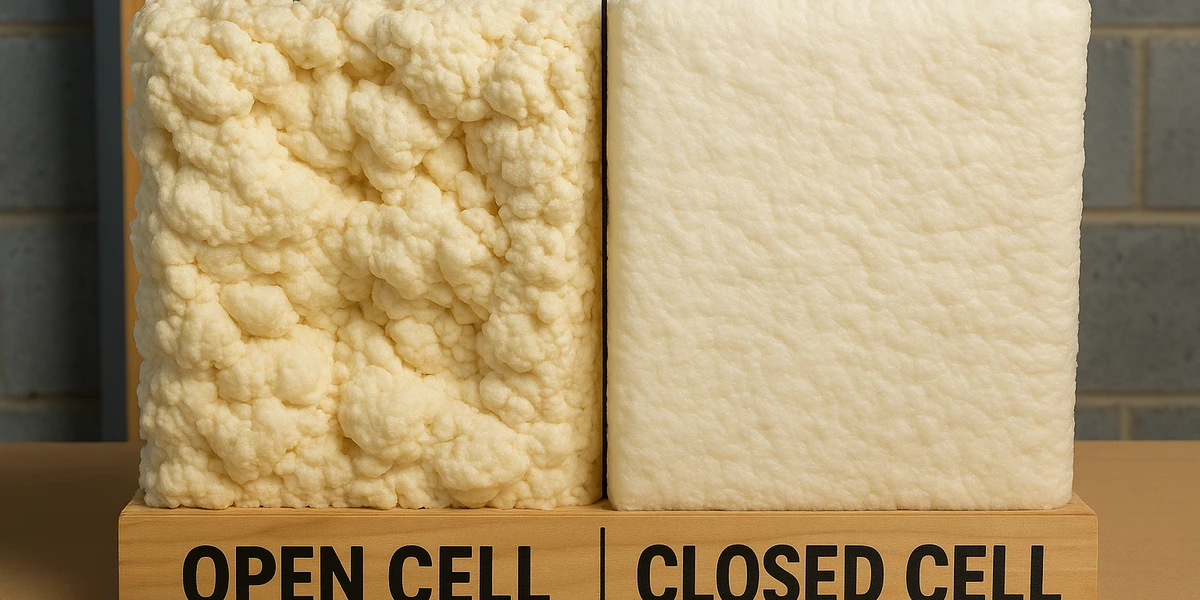Every week, we get the same questions: "What's the difference between open cell and closed cell?" "Which one should I choose?" "Is the more expensive one always better?" Let's clear up the confusion once and for all.
After installing both types in thousands of DC-area homes, we've learned that the "best" choice isn't always obvious. It depends on your specific situation, budget, and goals. Here are the questions we hear most often—and the honest answers.
What's the Actual Difference?
Think of it this way: imagine a sponge (open cell) versus a foam cooler (closed cell).
Open cell spray foam has tiny air pockets that are connected to each other. It's softer, more flexible, and allows some air and moisture to pass through.
Closed cell spray foam has air pockets that are completely sealed off from each other. It's rigid, dense, and creates a complete air and moisture barrier.
"Which One Insulates Better?"
Closed cell wins on R-value per inch:
- Closed cell: R-6 to R-7 per inch
- Open cell: R-3.5 to R-4 per inch
But here's the thing—R-value isn't everything. Open cell still provides excellent insulation, and in many applications, the difference doesn't matter much.
"Is Closed Cell Worth the Extra Cost?"
This is the big question. Closed cell typically costs 40-60% more than open cell. Is it worth it?
It depends on where you're using it:
When Closed Cell Makes Sense:
- Basements and crawl spaces (moisture control is critical)
- Exterior walls (you want maximum R-value in limited space)
- Rooflines (structural strength and moisture protection)
- Flood-prone areas (closed cell won't absorb water)
When Open Cell Works Great:
- Attics (plenty of space, moisture isn't usually an issue)
- Interior walls (sound dampening is a bonus)
- Budget-conscious projects (still way better than fiberglass)
"Will Open Cell Cause Moisture Problems?"
This is a big concern for DC homeowners, and rightfully so. Our climate is humid.
The short answer: not if it's installed correctly.
Open cell is vapor permeable, which means moisture can move through it. In most attic applications, this is actually a good thing—it allows the building to "breathe" and prevents moisture from getting trapped.
However, in basements or crawl spaces where moisture is a constant concern, closed cell is usually the better choice.
"Which One Is Better for Soundproofing?"
Open cell wins here. Its softer, more flexible structure absorbs sound better than the rigid closed cell foam.
If you're insulating between floors or interior walls and noise reduction is important, open cell is your friend.
"Can I Mix Both Types in My Home?"
Absolutely! In fact, we do this all the time. A typical project might include:
- Closed cell in the basement (moisture control)
- Open cell in the attic (cost-effective insulation)
- Closed cell on exterior walls (maximum R-value)
This gives you the benefits of both while managing costs.
"How Long Does Each Type Last?"
Both types, when properly installed, will last for the life of your home. We've seen 20+ year old installations that still look and perform like new.
The key is proper installation. Poor installation will cause problems with either type.
"Which One Do You Recommend Most Often?"
Honestly? It's about 60% open cell, 40% closed cell in our typical residential projects.
For most attic insulation projects (which make up a big chunk of our work), open cell provides excellent performance at a more reasonable cost. For basements, crawl spaces, and situations where space is limited, closed cell is usually worth the investment.
"What About DIY Spray Foam Kits?"
We get asked this a lot. Our honest answer: don't.
Spray foam installation requires proper equipment, training, and safety gear. We've seen too many DIY disasters that ended up costing more to fix than professional installation would have cost in the first place.
Plus, most manufacturers' warranties are void if the foam isn't installed by certified professionals.
The Bottom Line
There's no universal "best" choice between open and closed cell. The right answer depends on your specific situation:
- Budget-conscious with an attic project? Open cell is probably perfect.
- Dealing with moisture issues? Closed cell is worth the investment.
- Want maximum insulation in limited space? Closed cell wins.
- Soundproofing is important? Open cell is your best bet.
The good news? Either choice will dramatically outperform fiberglass insulation and make your home more comfortable and energy-efficient.
Still Not Sure Which Type Is Right for You?
Every home is different, and the best choice depends on your specific situation. We'd be happy to take a look and recommend the most cost-effective solution for your needs.
Get Your Free Assessment